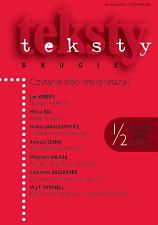"Cóż winna jest ziemia, [...] że ciemne upoiory są tutaj nieśmiertelne [...]?" Polacy w powojennej literaturze jidysz (1945-1968)
"It is not the land's fault that the dark demons seem immortal here..." Polish people in postwar Yiddish literature (1945-1968)
Author(s): Magdalena RutaSubject(s): Literary Texts
Published by: Instytut Badań Literackich Polskiej Akademii Nauk
Keywords: Efroim Kaganowski; Yehaye Shpigel; Leyb Olitski; Yiddish Literature 20.c;
Summary/Abstract: Israel Bartal wrote that in modern Hebrew and Yiddish literatures of the turn of the 19th century the image of “goy” underwent modifications depending on the historical and social conditions, expressing fears and defensive reactions of the Jews originating in the encounter with the world of Christianity. Ethnic stereotypes fixed in Jewish consciousness were most often of negative character. The situation changed when the maskilim (representatives of the Jewish Enlightenment), having undertaken the modernisation of traditional way of life, worked out a new model of the relationship with the outside world. In Jewish Enlightenment literature there emerged at that time a new type of a non-Jew – it was a representative of the enlightened non Jewish intelligentsia, supporting the efforts of the reformers. The survey offered by the author of the image of a Pole in short stories published after 1945: Efroim Kaganowski's Letster veg, Yeshaye Shpigel's Mishpokhe Lipshits geyt in geto as well as Leyb Olitski's Oyslendishe valiute provides a confirmation of the co-existence of the two ways of presenting non-Jews. However, the conditions in which these stories were written decided on the character of the images presented there: there dominate negative images alluding to rather bad Polish-Jewish relations from the time of the war and soon after.
Journal: Teksty Drugie
- Issue Year: 2012
- Issue No: 1-2
- Page Range: 227-241
- Page Count: 15
- Language: Polish

